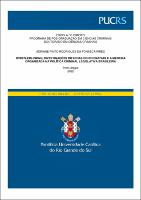| Share record |


|
Please use this identifier to cite or link to this item:
https://tede2.pucrs.br/tede2/handle/tede/10192| Document type: | Tese |
| Title: | Whistleblowing, investigações internas corporativas e a mentira organizada na política criminal legislativa brasileira |
| Author: | Pires, Adriane Pinto Rodrigues da Fonseca  |
| Advisor: | Souza, Paulo Vinícius Sporleder de |
| Abstract (native): | Esta pesquisa se refere a uma análise, sob o viés da Política Criminal legislativa, sobre o modo e o contexto em que se deu a inserção do instituto do whistleblowing (denúncia privada) no direito brasileiro a partir do advento da Lei nº 13.964/2019 (o conhecido “Pacote Anticrime”). Em paralelo, o estudo é conduzido para o exame das investigações internas corporativas, uma consequência da atuação de um whistleblower (reportante) interno (modalidade não normatizada no Brasil) e dos impactos provocados por esses procedimentos sobre o direito à não autoincriminação do indivíduo investigado. Identifica-se, no contexto desses dois sustentáculos dos programas de compliance – programas de whistleblowing e investigações internas corporativas -, duas situações de vulnerabilidade dos sujeitos envolvidos: a proteção não concretizável dada ao whistleblower por meio da novel legislação e a fragilidade, em razão da ausência de regramento específico e de controle judicial, das condições de defesa de uma pessoa individual sujeita a investigação realizada no interior de uma pessoa jurídica. A hipótese desenvolvida é a de que, como política pública que é, a legitimação democrática da política criminal legislativa brasileira perpassa pela preservação da verdade dos fatos, como condição anterior (pré-política) ao debate político livre, a ser concretizado pela criação de um ato legislativo. O exame da política criminal nacional, em relação a esses dois pilares dos programas de compliance, está estruturado a partir do diálogo com o pensamento de Hannah Arendt, especialmente no que diz respeito ao trato da verdade e da mentira organizada em dois textos de referência da autora - A Mentira na Política e Verdade e Política. Como eixos de análise, examinam-se os discursos inseridos nas justificativas constantes de projetos de lei em tramitação e no projeto que deu origem à lei vigente, abordando-se, também, as incongruências e omissões da legislação vigente. Propõe-se que, a partir de um reencontro com a verdade factual, o discurso político-criminal seja reorientado em direção a uma racionalidade ética e não eficientista, o que pode pemitir a superação da situação de fracasso democrático para o qual foi conduzida a política criminal atual. |
| Abstract (english): | The present research refers to an analysis, under the perspective of Legislative Criminal Policy, about the context in which the whistleblowing has inserted in the Brazilian legal system from the enactment of the Federal Act no. 13,964/2019 (named as "Anti-Crime Package"). In conjunction with it, this study is conducted to examine internal corporate investigations, a consequence of an internal whistleblower performance (in Brazil this particular mode has not been regulated yet) and the impacts caused by these procedures on the right of non-self-incrimination of a person under investigation. In the context of these two mainstays of compliance programs - whistleblowing programs and internal corporate investigations -, two situations of people vulnerability are identified: the unrealizable protection given to the whistleblower through the novel legislation and the fragility of right of non-self-incrimination, due to the absence of specific rules and judicial control, of an individual during an internal investigation process within a corporation. The hypothesis developed is that, as a public policy, the democratic legitimation of the Brazilian legislative criminal policy involves the preservation of the factual truth, as a prior (pre-political) and pivotal condition of a free political debate, which will come out later, through the legal enactment. The examination of national criminal policy, in relation to these two pillars of compliance programs, is based on the dialogue with Hannah Arendt’s thought, especially in regard to the dealing with truth and lies in politics in two important essays - “Lying in Politics” and “Truth and Politics”. As axes of analysis, it examines political-criminal discourses placed in the justifications within the draft bills in progress and in the current legislation. Alongside, this research focuses on the exam of failures and omissions in Brazilian legislation . It is proposed that, from a re-encounter with the factual truth, the discourse of criminal policy must be reoriented towards to be grounded in an ethical and non-efficiency rationality, which will allow the overcoming of the democratic failure, the current place of Brazilian criminal policy. |
| Keywords: | Whistleblowing Investigações Internas Corporativas Política Criminal Legislativa Mentira Organizada Lei Federal nº 13.964/2019 Internal investigations Legislative criminal policy Lying in politics Federal Act no. 13,964/2019 |
| CNPQ Knowledge Areas: | CIENCIAS SOCIAIS APLICADAS::DIREITO |
| Language: | por |
| Country: | Brasil |
| Publisher: | Pontifícia Universidade Católica do Rio Grande do Sul |
| Institution Acronym: | PUCRS |
| Department: | Escola de Direito |
| Program: | Programa de Pós-Graduação em Ciências Criminais |
| Access type: | Acesso Aberto |
| Fulltext access restriction: | Trabalho será publicado como artigo ou livro |
| Time to release fulltext: | 48 meses |
| Date to release fulltext: | 06/05/2025 |
| URI: | https://tede2.pucrs.br/tede2/handle/tede/10192 |
| Issue Date: | 21-Jan-2022 |
| Appears in Collections: | Programa de Pós-Graduação em Ciências Criminais |
Files in This Item:
| File | Description | Size | Format | |
|---|---|---|---|---|
| TES_ADRIANE_PINTO_RODRIGUES_DA_FONSECA_PIRES_COMPLETO.pdf | ADRIANE_PINTO_RODRIGUES_DA_FONSECA_PIRES_TES | 2.81 MB | Adobe PDF |  Download/Open Preview |
Items in DSpace are protected by copyright, with all rights reserved, unless otherwise indicated.




